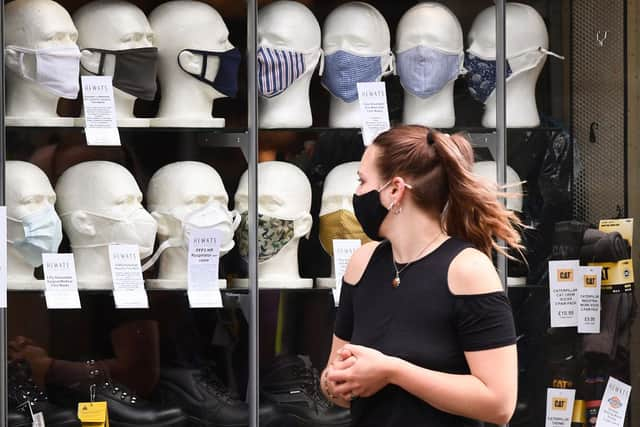South African variant: what is the Covid strain present in the UK, is it more deadly - and does it work with vaccines?
Further surge testing will take place after cases of the South African Covid variant were identified.
The Department for Health and Social Care has confirmed additional testing and genomic sequencing is being deployed in parts of south-east London.
Advertisement
Hide AdAdvertisement
Hide AdExtensive contact tracing will also take place to help determine the route of transmission for people who test positive with the Covid variant.


Concern has grown after a small study suggested the Oxford-AstraZeneca vaccine offered "minimal protection" against mild disease.
The South Africa strain could be up to 60% more transmissible than regular Covid.
Here's all you need to know about the South African variant.
Why does the new variant spread faster?
The South African variant of the virus, known as 501.V2, carries a mutation called E484K, which is not present in the UK strain.
Scientists have discovered the variant has a change to its spike protein - what the virus uses to gain entry to human cells - which has caused some alarm.
This is because it is also the bit of the virus that the vaccines are designed around to produce an antibody response which fights off any infection.
Professor Francois Balloux, from University College London, said: "The E484K mutation has been shown to reduce antibody recognition. As such, it helps the virus SARS-CoV-2 to bypass immune protection provided by prior infection or vaccination."
Is the new South African variant more deadly?
Advertisement
Hide AdAdvertisement
Hide AdEven though both the South African and UK Covid variants appear to be more transmissible, there is no current evidence to suggest they cause more serious illness, say experts.
“It is not anticipated that this mutation is sufficient for the ‘South African’ variant to bypass the protection provided by current vaccines," said professor Balloux.
"It’s possible that new variants will affect the efficacy of the Covid vaccines, but we shouldn’t make that assumption yet about the South African one."
Measures introduced such as staying at home, social distancing, face coverings and washing your hands will help limit the spread of Covid.
What are the symptoms of the new South African variant?
Like the original form of Covid, symptoms of Covid-19 include a high temperature, continuous cough and loss of taste or smell.
Scientific experts are yet to discover whether the new strains of the virus cause different or worse symptoms than the first.
One of the scientists who identified the new variant in South Africa, professor Richard Lessells of the KwaZulu-Natal Research Innovation and Sequencing Platform in Durban, said it was highly unlikely patients will experience different symptoms.
“It’s highly unlikely that it would have any different clinical symptoms,” he said.
Advertisement
Hide AdAdvertisement
Hide Ad“There’s no reason to believe that and that wouldn’t fit with our understanding. But one of our concerns is could there be a difference in the progression of the disease and a more aggressive disease course.”
Sir Patrick Vallance, the government’s chief scientific advisor, said the new UK variant was not causing those infected to get a more serious illnesses.
How effective are the vaccines?
A study completed by Pfizer has discovered its vaccine is effective against both the South African and UK strains of the virus.
Both strains of the virus share the N501Y mutation, which is thought to make the variants more infectious, and has caused international concern.
But research conducted at the University of Texas found the Pfizer vaccine stimulated a strong immune response against the N501Y mutation.
Dr Phil Dormitzer, one of Pfizer's top viral vaccine scientists, said the study - yet to be peer reviewed - was encouraging.
“We've now tested 16 different mutations, and none of them have really had any significant impact. That's the good news,” he said. “That doesn't mean that the 17th won't.”
Scientists at the University of Oxford are looking at the impact its vaccine has on the new variants and hope to have more data within weeks.
The Moderna vaccine has also shown to be effective against the South African variant, according to early testing data.